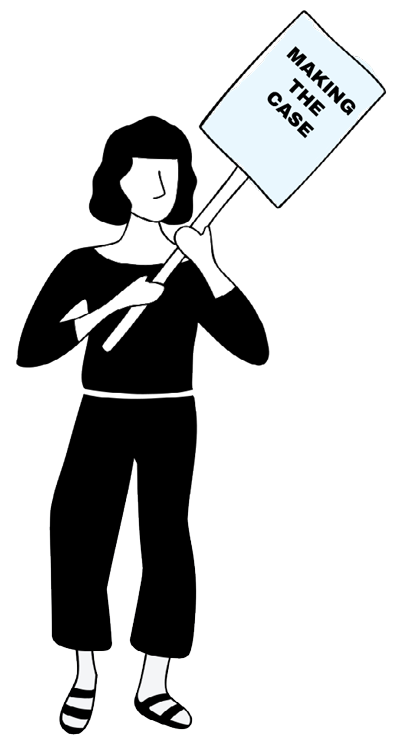
What to consider
as an organizer…
WHO IS CONSIDERING A NEW JOB

Thinking about a new organizing job? This page is here to help you take stock of what you need, what you deserve, and what to ask for. From questions to bring into interviews to tools for evaluating offers, this is designed to support you in advocating for yourself as powerfully as you advocate for others.
What to look for in a job description
Not all organizing jobs are created equal. The size, budget, location, and issue-focus of an organization impact the job responsibilities, structure, and compensation made available. In New York City, many organizing roles require travel, extended hours, coalition work, and engaging with different types of communities. While it is impossible to know exactly what a job will feel like until you’re doing it, look out for the following to make sure an organizing role is a good fit for you and will meet your expectations:
Transparency
- Salary range with criteria for where someone will fall in the range
- Concise breakdown of benefits (including healthcare breakdown, retirement, PTO, and fringe benefits)
- Hours expected to work and whether or not travel is required
- Expectation of tenure (how long an organizer is desired to stay in the role or organization)
Responsibilities and Qualifications
- Job description should have a detailed overview of responsibilities, ideally broken down into percentages
- Examples of tasks specific to responsibilities: what will an ideal day or week look like?
- Experience level and skills needed to succeed in the role, with added values or nice-to-haves included
- Goals for this position as they relate to the overall mission of the organization and/or specific campaigns.
Organizational Culture
- How is this job description written? Does it include any elements of the organization’s personality or priorities?
- Does this job posting mention any kind of information on or connection to the community where this organization is located or the community it serves?
- Does the job description mention the structure of the team and who the position will report to?
What to ask hiring managers
When looking for an organizing job, remember you are interviewing them just as much as they are interviewing you. In order to get a proper assessment of what working at an organization will look like, you can ask questions at every stage of the interview process in order to determine if this is the right place for you to work.

Expectations and Reciprocity
What does accountability look like, and what type of management style does your potential supervisor adhere to?
What are the time commitments expected of this role? Are there evening or weekend hours and if so, how often? When are campaign seasons the
heaviest, and are there any opportunities for comp time during heavy work seasons?
Opportunities for Growth or Advancement Within the Organization
How many people on staff have held multiple
positions or received promotions?
What does this role look like after two years of work?
Are there any gaps on the team that can eventually be filled with experience and leadership?
What is the process for pay and performance reviews?
Vision of Success
What does a successful year look like for someone holding this role?
What does success look like outside of campaign wins?
How is success acknowledged and celebrated at this organization?
Team and Managerial Culture
How is work divided on this team?
What does decision-making look like at a departmental and organizational level?
Have there been any recent turnover or any major organizational changes?
Are there any systems in place to mitigate burnout or encourage wellness of organizers?
Hiring Process:
Things to watch out for
- Unclear expectations
- High staff turnover and organizational transitions
- Minimal communication or lack of clarity in
interview process - Rushed and/or extensive interview processes
- No mention of benefits or paid time off
- Vague description of role and responsibilities, and an inability to elaborate when asked
- No introduction to members of team or direct supervisor after being hired
- Short tenure of organizers that may reflect a lack of stability and growth pipeline
- Discouraging the sharing of wage information
- Lack of diversity among identities within organizational leadership
- Grant-funded or temporary positions that are listed without a timeline for re-evaluation
ORGANIZING MANAGER WHO WANTS TO BETTER SUPPORT THEIR DIRECT REPORTS

One of the most challenging aspects of working as an organizing manager is balancing the realities of an organization with the individual needs of an organizer or organizing team. In this study, we spoke to organizers who cited support from their supervisor as one of the biggest factors contributing to job satisfaction. In order to develop a culture of mutual accountability, it is important for an organizing manager to think about the immediate needs of their organizers and how meeting those needs can positively impact their team and the organization as a whole.
Some questions to consider:
- Does this organizer have all the resources they need to do their job effectively?
- Are they paying for transportation to required meetings out of pocket?
- Are they using their personal cell phone to communicate with their members? If so, can your organization offer reimbursement?
- Do they have a computer provided by the organization?
- Is there a language gap between the organization’s base and organizers on staff?
- Is there a system in place to take over someone’s workload when required?
- Are organizers able to use their PTO without having workloads pile up or campaigns suffer?
- Are organizers who take on more work when others are out compensated accordingly or provided with comp time?
- Are there systems to check in with organizers on how they are managing their capacity and workloads?
- Do organizers have access to professional development and learning opportunities?
- Have your organizers shown an interest in or need for building new skills or developing their craft?
- Is there money in the departmental or organizational budget for organizers to use for professional development as a team and/or individually?
- Are there gaps in knowledge on your organizing team that can be filled with training or political education?
- Are organizers valued as whole people?
- Do they have any special skills or qualifications they bring to the team?
- Do they have any special circumstances to consider (such as caretaking, parenting, or other needs)?
- Are there any opportunities or funds available for mental and emotional wellness?
A helpful framework to prepare yourself for a conversation with organizational leadership:
- What elements of the work can be improved or increased with additional resources or capacity?
- How do the resources allocated to the organizing department compare with other departments on staff?
- What does the volume of work look like for the organizing team? Will there be periods of increased workloads or new campaigns in the near future?
- How have organizers found success in other elements of their work outside of campaign wins (i.e. increased membership base, number of trainings provided, etc.)?
- Consider timing: Is the organization performing well financially? Has the organizer recently achieved significant success?
Advocating for Organizers
Advocating for organizers is an important responsibility for managers to prioritize when building and sustaining their teams. While many supervisory approaches measure a staff member’s productivity relative to their quantitative “successes,” in a distinct job like organizing, success isn’t always so straightforward. For example, even if a campaign is ultimately unsuccessful, metrics could include the number and depth of relationships built with partners and members, the organizer’s ability to change course or make quick decisions during the campaign, and whether or not the organizer can draw insightful conclusions about the strategy for next time.
Organizing managers interviewed in this study spoke to the difficulties they face advocating for their organizers when working with organizational leadership to make merit-based pay or title increases. Metrics-driven performance evaluations often result in strained communication between managers and the organizers they work with, who might not have a full understanding of how leadership interprets their organizing efforts or how their performance impacts potential wage increases or other changes in their position.
Merit-based raises can be tricky, especially given the nuanced nature of organizing work. Proposing a raise or upward mobility for organizers isn’t always straightforward to organizational decision-makers who might not be entirely plugged in to what’s happening in the day-to-day work of organizing teams. There are steps you can take to think through what uniquely qualifies an organizer’s salary and title increases, while still considering the capacity of the organization as a whole:

Tips for making the case:
- Gather evidence of positive performance: Compile data and examples that demonstrate the organizer’s achievements, contributions, and overall performance. Highlight specific projects, improvements, or campaigns that showcase their value to the team and the organization.
- Take an organizational standpoint: Frame the raise as an investment, rather than just a cost. Show how investing in an organizer will help sustain the organizing team, increase retention, and contribute to strategic goals.
- Highlight unique contributions: Point out any specific skills, responsibilities, or talents that the organizer has offered, making sure to note when this has gone beyond their baseline job description.
- Discuss professional growth: Show how the organizer has grown in their role with examples of how they have led initiatives, acquired new skills, assisted with management, or taken on additional responsibilities. This will demonstrate their value and commitment to their organizing role.
- Understand market rates: Come ready with data on industry standards, salary benchmarks, and tangible examples from similarly-sized organizations to make your case.
By thinking through logistics and providing relevant data, you can build compelling justification that not only advocates for your organizer, but also recognizes the perspective of organizational leadership and aligns with the broader goals of the organization.